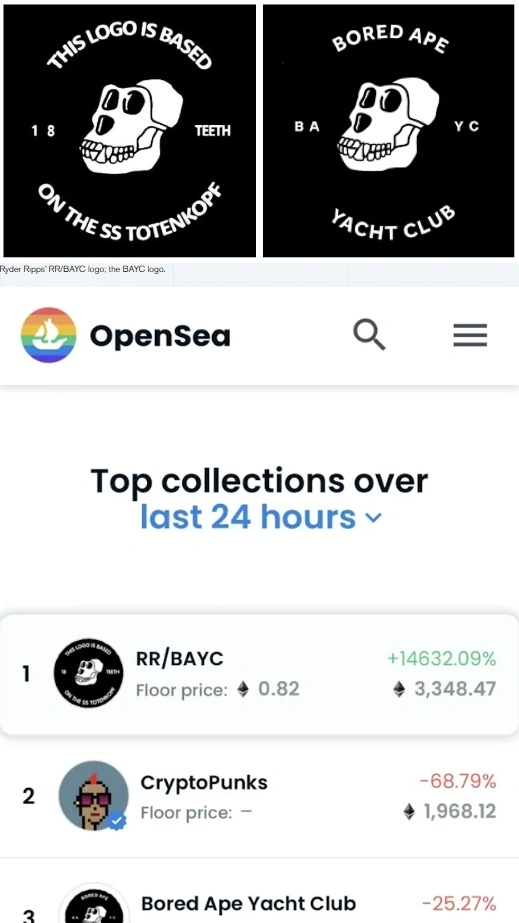Bored Ape Yacht Club declares war on artist Ryder Ripps, will it backfire?
Original Title: 《The Internal and External Troubles of "Bored Ape" BAYC》
Written by: Sander Lutz
Translated by: Moni
A well-known artist claims that the largest NFT brand on Earth is secretly run by Nazi supporters, and this artist subsequently began selling a counterfeit NFT series of the brand, netting $1.8 million. Some people see this artist as a moral compass, while others believe he is shamelessly cashing in on the "NFT craze." Now, the NFT brand is suing this artist, and the ultimate impact of the case is likely to be more profound than either side anticipates ------
This is the story of conceptual artist Ryder Ripps and Yuga Labs, the $4 billion company behind "Bored Ape" BAYC. At the end of June, Yuga Labs officially filed a federal lawsuit against Ryder Ripps, causing a stir in the NFT and broader crypto world, with key points of focus including:
Did the creators of BAYC really embed racist discrimination and Nazi symbols in this NFT project, especially since BAYC has received endorsements from celebrities like Stephen Curry, Jimmy Fallon, and Madonna?
Was the entire situation meticulously orchestrated by Ryder Ripps? After all, he once falsely claimed to have redesigned the CIA logo;
Is this case a clear-cut defamation case?
What will the final ruling reveal?
Can NFTs be protected by copyright? (The copyright protection of images related to NFTs remains murky, as this could be a multi-billion dollar question.)
However, most people seem to overlook another key point in this lawsuit: Yuga Labs is not suing Ryder Ripps for defamation or copyright infringement; rather, this multi-billion dollar company is narrowly accusing Ryder Ripps of infringing on the "Bored Ape" trademark.
"The Million Dollar Question"
Regarding Yuga Labs' complete omission of copyright infringement in the lawsuit, University of Kentucky law professor Brian Fyre finds it somewhat strange: "This is really important; it's a bit unusual, interesting, and unexpected."
While copyright and trademark infringement are often closely related, they are two entirely different matters. Copyright protects the content of works: the plot of a book, the visual elements of a painting, the chorus of a song. On the other hand, trademarks protect the business name, logo, and slogan that constitute a brand. By not pursuing copyright infringement, Yuga Labs seems unconcerned about the fact that Ryder Ripps has profited millions of dollars by replicating thousands of "Bored Ape" NFT images. Why is that?
Zahr Said, associate dean for research at the University of Washington School of Law, answered the question: "This is a million-dollar question." For a company like Yuga Labs, the NFTs they sell may not be protected by copyright law.
Brian Fyre further elaborated:
"Many Bored Ape buyers view the so-called 'IP ownership' as a crucial component of the NFT value proposition. In fact, since last year, we have seen many Bored Ape owners attempt to turn their NFTs into unique clothing lines, music groups, hamburger restaurants, and television shows. Yuga Labs encourages this behavior, which makes sense because the community spirit of NFTs like BAYC depends on the assumption that NFT holders are not passive consumers but active community members with varying degrees of control over the NFTs they purchase."
However, in this case, the copyright structure of "Bored Ape" NFTs may legally lose its efficacy. Artist and lawyer Dave Steiner pointed out that Yuga Labs may not have any rights to "Bored Ape" BAYC at all, a fact that could significantly diminish the company's value. Additionally, since the 10,000 "Bored Apes" in circulation are nearly identical and typically feature only one trait, such as an earring, the law may only grant copyright to the very first purchasers of "Bored Apes," as those images were unique at the time.
According to Dave Steiner's explanation, apart from the first batch of "Bored Apes," the law would consider each subsequent "Bored Ape" NFT as some variant of these "originals." For example, if an earring is drawn on a Mickey Mouse image, the law would not consider this earring-wearing Mickey Mouse to be copyright protected; it's just a Mickey Mouse with an earring, nothing more. From this legal perspective, the vast majority of Bored Ape NFTs (over 99%) are actually worthless in terms of copyright. Therefore, if Yuga Labs were to sue Ryder Ripps for infringement, it would undoubtedly open a Pandora's box for themselves, a complex issue they likely do not wish to deal with at this stage.
The same goes for defamation. While Yuga Labs has sufficient evidence to pursue Ryder Ripps for defamation, they have chosen not to do so, which is clearly a very wise decision. Why? Because once they sue Ryder Ripps for "defamation," it would mean that the NFT series launched by Ryder Ripps would be granted legal rights, and they would also have to provide a substantial amount of confidential evidence to prove that "Bored Apes" are not associated with racism and Nazism. Initiating a defamation lawsuit could lead to months of investigative discovery, turning into an endless public relations nightmare for Yuga Labs.
Two Monkeys Walk into the NFT Market
So, if it's neither copyright infringement nor defamation, what is the reason for Yuga Labs to initiate the lawsuit?
The law firm Fenwick & West, hired by Yuga Labs, has helped tech giants like Facebook, Amazon, Apple, eBay, and Oracle resolve numerous intellectual property disputes. In June of this year, they officially filed a lawsuit in the U.S. District Court for the Central District of California, which only mentioned that Ryder Ripps infringed on Yuga Labs' trademark, with claims primarily focused on Ripps' use of the "Bored Ape" logo and brand.
"You bought a counterfeit Louis Vuitton bag for $10; you know it's not the real deal, right? But the point is, you bought it because of the trademark."

Ryder Ripps named his NFT series RR/BAYC, but it is important to note that as of now, Yuga Labs does not actually hold the trademark for the BAYC name and logo, as their trademark application is still under review, allowing them to seek protection for these trademarks in court. However, Yuga Labs' lawyers must prove that Ryder Ripps created a "likelihood of confusion" for consumers by invoking the "Bored Ape" trademark. Nevertheless, Yuga Labs may not need to prove that every buyer of RR/BAYC NFTs was deceived into purchasing "fake monkeys"; they only need to show that the collectible value of RR/BAYC is tied to the value of BAYC.
Convincing the Court While Pleasing the Community: BAYC's Dilemma
What is Ryder Ripps' motivation behind his attack on "Bored Apes"? Does Ryder Ripps want to single-handedly overturn this multi-billion dollar NFT project? Is Ryder Ripps eager to gain attention and more visibility by criticizing "Bored Apes"?
Some say that from a conspiracy theory perspective, perhaps Ryder Ripps hopes Yuga Labs will sue him.
Yitzy Hammer, a partner at blockchain legal consulting firm DLT Law, pointed out sharply that suing is not a very suitable action for Web3, as initiating lawsuits against NFT projects is quite rare in the NFT art and Web3 culture world, which has a decentralized community ethos. Christian Tenkhoff, a partner at the law firm Taylor Wessing specializing in trademarks and Web3 business, also stated that although NFT owners view IP as a primary value proposition, in decentralized communities, most people consider IP to be an "old-fashioned thing, from the old world, centralized, and shouldn't even exist."
So far, Yuga Labs has been carefully nurturing its reputation, avoiding conflicts with the Web3 community. Therefore, Ryder Ripps' provocation may put Yuga Labs in another difficult position: associating the "Bored Ape" brand with Nazism. And this is actually the issue that Yuga Labs is most concerned about.
Moreover, the timing of Yuga Labs' lawsuit raises questions. Yuga Labs only filed the lawsuit on June 24, when Ryder Ripps' RR/BAYC sales on OpenSea had already surpassed BAYC. University of Kentucky law professor Brian Fyre added:
"My intuition tells me that Yuga Labs initiated the lawsuit possibly just to try to get Ryder Ripps to stop disparaging their brand (after all, accusations of Nazism are no small matter), rather than genuinely worrying about trademark infringement. In many ways, they just felt they needed to fight back."

But regardless of the motivation, Yuga Labs is now in a "dilemma." On one hand, Yuga Labs was born from the experimental, decentralized NFT world; on the other hand, as their brand value grows, Yuga Labs needs to establish market dominance in the centralized real world and protect their trademarks and brand value, which may be a path they have to choose. However, the most challenging aspect is how to make the Web3 community understand their viewpoint.
Christian Tenkhoff, a partner at Taylor Wessing, summarized:
"Yuga Labs must win on both sides, convincing the court while pleasing the community, as gaining the support of the Web3, NFT, and Twitter communities is extremely, extremely important for Yuga Labs."









